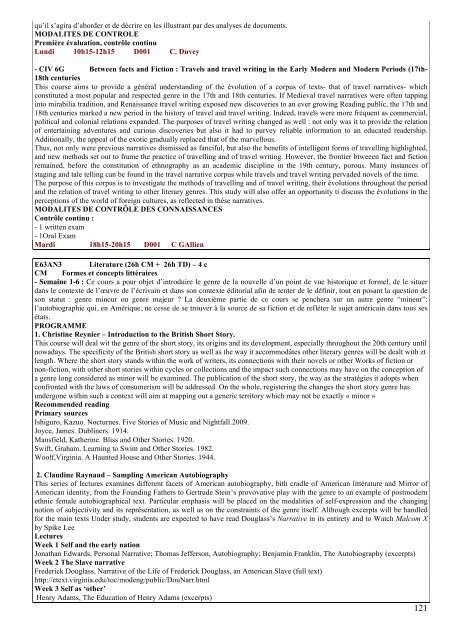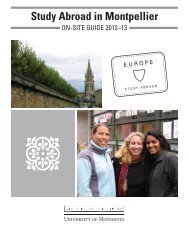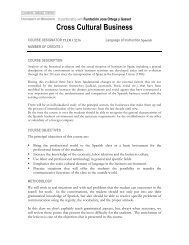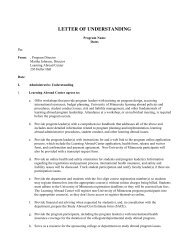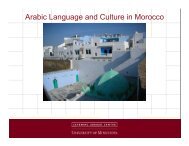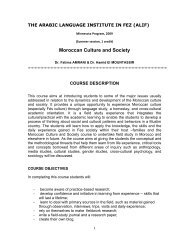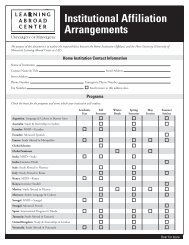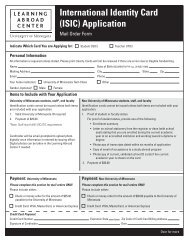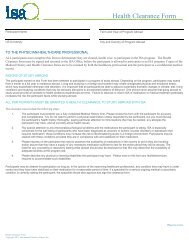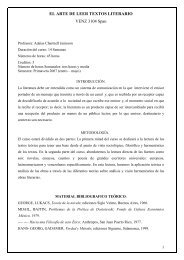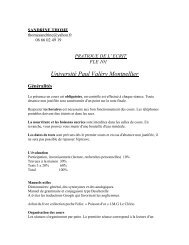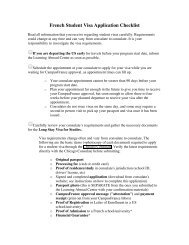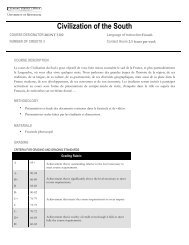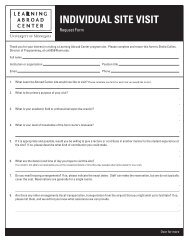04 67 79 15 42 2012-2013 SEMEST - University of Minnesota
04 67 79 15 42 2012-2013 SEMEST - University of Minnesota
04 67 79 15 42 2012-2013 SEMEST - University of Minnesota
You also want an ePaper? Increase the reach of your titles
YUMPU automatically turns print PDFs into web optimized ePapers that Google loves.
qu’il s’agira d’aborder et de décrire en les illustrant par des analyses de documents.<br />
MODALITES DE CONTROLE<br />
Première évaluation, contrôle continu<br />
Lundi 10h<strong>15</strong>-12h<strong>15</strong> D001 C. Duvey<br />
- CIV 6G Between facts and Fiction : Travels and travel writing in the Early Modern and Modern Periods (17th-<br />
18th centuries<br />
This course aims to provide a général understanding <strong>of</strong> the évolution <strong>of</strong> a corpus <strong>of</strong> texts- that <strong>of</strong> travel narratives- which<br />
constituted a most popular and respected genre in the 17th and 18th centuries. If Medieval travel narratives were <strong>of</strong>ten tapping<br />
into mirabilia tradition, and Renaissance travel writing exposed new discoveries to an ever growing Reading public, the 17th and<br />
18th centuries marked a new period in the history <strong>of</strong> travel and travel writing. Indeed, travels were more fréquent as commercial,<br />
political and colonial relations expanded. The purposes <strong>of</strong> travel writing changed as well : not only was it to provide the relation<br />
<strong>of</strong> entertaining adventures and curious discoveries but also it had to purvey reliable information to an educated readership.<br />
Additionally, the appeal <strong>of</strong> the exotic gradually replaced that <strong>of</strong> the marvellous.<br />
Thus, not only were previous narratives dismissed as fanciful, but also the benefits <strong>of</strong> intelligent forms <strong>of</strong> travelling highlighted,<br />
and new methods set out to frame the practice <strong>of</strong> travelling and <strong>of</strong> travel writing. However, the frontier btweeen fact and fiction<br />
remained, before the constitution <strong>of</strong> ethnography as an academic discipline in the 19th century, porous. Many instances <strong>of</strong><br />
staging and tale telling can be found in the travel narrative corpus while travels and travel writing pervaded novels <strong>of</strong> the time.<br />
The purpose <strong>of</strong> this corpus is to investigate the methods <strong>of</strong> travelling and <strong>of</strong> travel writing, their évolutions throughout the period<br />
and the relation <strong>of</strong> travel writing to other literary genres. This study will also <strong>of</strong>fer an opportunity ti discuss the évolutions in the<br />
perceptions <strong>of</strong> the world <strong>of</strong> foreign cultures, as reflected in thèse narratives.<br />
MODALITES DE CONTRÔLE DES CONNAISSANCES<br />
Contrôle continu :<br />
- 1 written exam<br />
- 1Oral Exam<br />
Mardi 18h<strong>15</strong>-20h<strong>15</strong> D001 C GAllien<br />
E63AN3 Literature (26h CM + 26h TD) – 4 c<br />
CM Formes et concepts littéraires<br />
- Semaine 1-6 : Ce cours a pour objet d’introduire le genre de la nouvelle d’un point de vue historique et formel, de le situer<br />
dans le contexte de l’œuvre de l’écrivain et dans son contexte éditorial afin de tenter de le définir, tout en posant la question de<br />
son statut : genre mineur ou genre majeur ? La deuxième partie de ce cours se penchera sur un autre genre “mineur”:<br />
l’autobiographie qui, en Amérique, ne cesse de se trouver à la source de sa fiction et de refléter le sujet américain dans tous ses<br />
états.<br />
PROGRAMME<br />
1. Christine Reynier – Introduction to the British Short Story.<br />
This course will deal wit the genre <strong>of</strong> the short story, its origins and its development, especially throughout the 20th century until<br />
nowadays. The specificity <strong>of</strong> the British short story as well as the way it accommodâtes other literary genres will be dealt with zt<br />
length. Where the short story stands within the work <strong>of</strong> writers, its connections with their novels or other Works <strong>of</strong> fiction or<br />
non-fiction, with other short stories within cycles or collections and the impact such connections may have on the conception <strong>of</strong><br />
a genre long considered as minor will be examined. The publication <strong>of</strong> the short story, the way as the stratégies it adopts when<br />
confronted with the laws <strong>of</strong> consumerism will be addressed. On the whole, registering the changes the short story genre has<br />
undergone within such a context will aim at mapping out a generic territory which may not be exactly « minor »<br />
Recommended reading<br />
Primary sources<br />
Ishiguro, Kazuo. Nocturnes. Five Stories <strong>of</strong> Music and Nightfall.2009.<br />
Joyce, James. Dubliners. 1914.<br />
Mansfield, Katherine. Bliss and Other Stories. 1920.<br />
Swift, Graham. Learning to Swim and Other Stories. 1982.<br />
Woolf,Virginia. A Haunted House and Other Stories. 1944.<br />
2. Claudine Raynaud – Sampling American Autobiography<br />
This series <strong>of</strong> lectures examines different facets <strong>of</strong> American autobiography, bith cradle <strong>of</strong> American littérature and Mirror <strong>of</strong><br />
American identity, from the Founding Fathers to Gertrude Stein’s provovative play with the genre to an example <strong>of</strong> postmodern<br />
ethnic female autobiographical text. Particular emphasis will be placed on the modalities <strong>of</strong> self-expression and the changing<br />
notion <strong>of</strong> subjectivity and its représentation, as well as on the constraints <strong>of</strong> the genre itself. Although excerpts will be handled<br />
for the main texts Under study, students are expected to have read Douglass’s Narrative in its entirety and to Watch Malcom X<br />
by Spike Lee<br />
Lectures<br />
Week 1 Self and the early nation<br />
Jonathan Edwards, Personal Narrative; Thomas Jefferson, Autobiography; Benjamin Franklin, The Autobiography (excerpts)<br />
Week 2 The Slave narrative<br />
Frederick Douglass, Narrative <strong>of</strong> the Life <strong>of</strong> Frederick Douglass, an American Slave (full text)<br />
http://etext.virginia.edu/toc/modeng/public/DouNarr.html<br />
Week 3 Self as ‘other’<br />
Henry Adams, The Education <strong>of</strong> Henry Adams (excerpts)<br />
121


